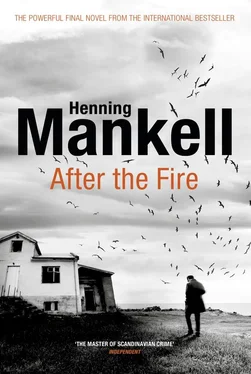‘I believe you’re a security guard,’ I said tentatively. ‘I hope we didn’t wake you.’
‘I don’t sleep much,’ Ahmed replied. ‘Perhaps deep down I’m already an old man. I believe you sleep less as you get older.’
I nodded. ‘Before that final slumber we sleep less and less over a number of years. As a doctor I ought to know why, but I can’t give you a reason.’
Louise poured coffee; Ahmed didn’t want any. I could see the love in her eyes when she looked at him. As she walked past him with the coffee pot, she quickly stroked his hair.
I asked Ahmed about his parents.
‘My father is dead. He worked on the docks in Algiers, and he was struck by a steel hawser from a ship. The tension was too tight, and it broke. He lost both legs and bled to death.’
‘I’m very sorry to hear that.’
‘Thank you.’
‘And your mother?’
‘Dead.’
He didn’t explain how she had died, and I didn’t ask.
‘Do you have any brothers or sisters?’
‘Two who are unfortunately no longer with us, one still alive.’
I thought that Ahmed was surrounded by many dead people. I tried to change the subject and asked about his job.
‘I look after stores where I could never afford to shop. Every night I enter a world which is otherwise closed to me.’
He looked at Louise.
‘To us,’ he corrected himself. ‘And to our child.’
‘Congratulations, by the way,’ I said. ‘I know these days people often find out in advance whether it’s a boy or a girl?’
Ahmed frowned. ‘We would never do that.’
‘We’re just having the scans to make sure everything is OK, given my age,’ Louise said.
I was finding the situation difficult to deal with. I suspected that Ahmed regarded me with a kind of controlled contempt. The fact that Louise was so besotted with him also bothered me. There was something submissive about the way she looked at him, the way she caressed his head. This was a Louise I had never seen before.
I couldn’t think of anything else to say. I almost felt insulted. Louise’s life choices were beyond my comprehension. She was a pregnant pickpocket living with an Algerian immigrant who had a hopeless job working nights as a security guard.
Ahmed got to his feet and left the kitchen; I wondered if he had read my mind.
‘He seems very nice,’ I said to Louise.
‘Do you really think I would have chosen to have a child with a man who wasn’t nice?’
Before I had time to answer, Ahmed was back. He had put on a pale blue shirt and a pair of shorts with Arabic lettering down the sides. He was carrying a glass bottle on a wooden stand, like a classic ship in a bottle.
‘A present for you,’ he said. ‘I might have to earn my living as a security guard at the moment, but this is the kind of thing I really want to do.’
He carefully put down the bottle and adjusted the table lamp so that I could see the contents.
This wasn’t a sailing ship that had been pushed through the narrow neck of a bottle to rest on stiff blue waves and then erected with the particular magic that characterises that patient art. This bottle contained a desert, its dunes billowing very differently from the waves formed by the sea. There was an ornate Bedouin tent, the opening allowing a glimpse of the interior, where men in white sat on soft cushions and veiled women served coffee or brought hookahs. Outside the tent a Bedouin dressed all in black was sitting on a horse, handing the reins to a servant. His turban was skilfully wound around his head.
I had some knowledge of the art of creating ships in bottles. My great-grandfather, who had worked on cargo ships on the North Sea before returning home to become a fisherman, had made a model of the Daphne ; she went down off the treacherous Skagen reefs one Christmas Day in the 1870s. A Danish fishing boat went out into the storm and managed to save the crew, but eight of the rescuers died. When I was a child my grandfather explained that the ship, with its tall masts and its tattered sails, had been pushed through the neck of the bottle while lying flat. Using a clever system of the finest threads, it was then possible to raise the masts and fix the sails, and to secure the ship on the waves, which were made of coloured modelling clay.
However, the Bedouin camp Ahmed had created was far more impressive than any ship in a bottle that I had ever seen. His technique and skill were outstanding. I realised that with those fingers he would probably be an excellent teacher for anyone who wanted to become a pickpocket.
‘It’s beautiful,’ I said. ‘Is this setting, with the tent and the man on the horse, something you’ve experienced yourself?’
‘I grew up in the kasbah in Algiers. The desert was far away, outside the city, but I saw pictures and films. And my father was a Bedouin; he spent his entire childhood as a nomad, with tents erected in a different place each evening.’
‘I should have brought you something,’ I said. ‘But I didn’t have much warning about this trip.’
‘I’m grateful that you helped Louise get out of prison.’
‘Thieving in Paris isn’t a very good idea,’ I said, immediately regretting my choice of words.
‘It’s over now,’ Louise said crossly. ‘Going on about it is no help at all.’
Ahmed reached out and placed his hand on her arm.
‘Your father is right. I don’t think Fredrik will mention it unnecessarily.’
He pronounced my name with a French accent, presumably to be polite. I was sorry about my earlier suspicions.
He stood up.
‘I think I need to sleep for a couple of hours more,’ he said.
He gave a slight bow and left the kitchen. Louise went with him, and I got ready to leave. After a few seconds she came back; I was standing there with the Bedouin bottle in my hand.
‘There’s something else you need to know,’ she said. ‘Put down the bottle.’
I did as she said and followed her into the room beyond the kitchen.
‘This is also my life,’ she said as she opened the door.
The room was small, painted white, simply furnished. A bed, a fitted carpet, a ceiling light. And a wheelchair. The chair was facing the window; I could just see hair and the back of someone’s neck.
‘This is Muhammed. We don’t need to whisper; he’s deaf.’
Louise went over to the wheelchair, and the person sitting there immediately produced a stream of incomprehensible noises. Louise turned the chair around. Muhammed was a seven- or eight-year-old boy. His face was distorted by a grimace that seemed to have stiffened into a rigid scar. He stared up at me. I had the feeling that the twisted mouth could let out a scream of angst at any moment.
‘This is my father Fredrik,’ Louise said in French, while simultaneously writing something on a screen linked to a computer attached to the chair.
She jerked her head to indicate that I should come closer.
‘He can’t move his hands, but you can say hello by touching his cheek.’
I did as she said, almost recoiling when I felt the boy’s skin. It was ice cold.
I knew there were a number of chronic illnesses where people are completely lacking in subcutaneous fat. They are very cold and can often suffer from a range of different mental or physical problems. Perhaps he had hydrocephalus, or water on the brain as it is sometimes called. However, his head didn’t seem unnaturally swollen, so I had doubts about my diagnosis.
‘Who’s his mother?’ I asked.
‘Muhammed is Ahmed’s brother,’ Louise explained. ‘Their mother had a breakdown when he was born and it became clear that he would never live a normal life. She sought refuge in mental illness, but Ahmed was determined to take care of him. That’s why he moved to France. For the first few years he looked after Muhammed alone, then I turned up. He will be like a brother to the child I’m expecting.’
Читать дальше












